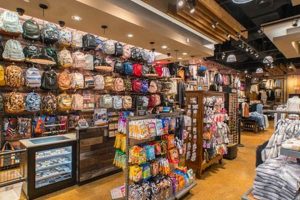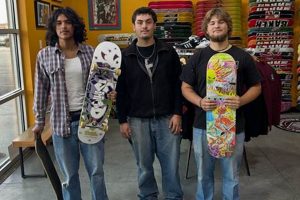A retail establishment located in Austin, Texas, specializing in equipment, apparel, and accessories related to skateboarding. These businesses typically offer a range of products, from complete skateboards and decks to wheels, trucks, and protective gear, along with clothing and footwear suited for skateboarding activity. For example, a person seeking to purchase a new skateboard deck or replace worn-out wheels would visit such a location.
Such businesses serve as crucial resources for the local skateboarding community. They provide access to specialized equipment unavailable at general sporting goods stores, offer expert advice and guidance from knowledgeable staff, and often act as hubs for local skaters to connect and learn about events or opportunities. The history of these shops mirrors the growth of skateboarding itself, evolving from surf shops that initially carried skateboards to dedicated establishments that cater specifically to the needs of skaters.
The following sections will delve into specific aspects of the skateboarding retail landscape within Austin, Texas. Detailed product offerings, community engagement strategies, and unique selling propositions will be explored, providing a comprehensive overview of this niche market.
Essential Guidance from Austin Skateboarding Retailers
The following insights are derived from established Austin skateboarding retailers, offering valuable advice for both novice and experienced skateboarders.
Tip 1: Prioritize Protective Gear: Always wear a helmet, knee pads, elbow pads, and wrist guards, regardless of skill level. Injuries can occur unexpectedly, and protective equipment significantly reduces the risk of severe harm. For example, a helmet can prevent head trauma from a fall, while wrist guards can mitigate the likelihood of fractures.
Tip 2: Select the Appropriate Board: Consider skating style and experience level when choosing a skateboard. Beginners may benefit from a wider deck for increased stability, while experienced skaters may prefer a smaller deck for enhanced maneuverability. Research different board types and consult with retail staff for personalized recommendations.
Tip 3: Maintain Equipment Regularly: Inspect skateboards for signs of wear and tear. Check wheels, bearings, trucks, and deck for damage. Replace worn parts promptly to ensure optimal performance and safety. Regular maintenance extends the lifespan of the skateboard and prevents accidents.
Tip 4: Learn Basic Skills First: Master fundamental skills, such as pushing, balancing, and stopping, before attempting more advanced tricks. Developing a solid foundation is essential for progression and reduces the risk of injuries. Start with flat ground practice and gradually progress to more challenging terrain.
Tip 5: Choose the Right Footwear: Wear skate shoes designed for skateboarding. These shoes typically feature durable materials, reinforced stitching, and flat soles for enhanced grip and board feel. Avoid running shoes or other footwear that may not provide adequate support or traction.
Tip 6: Understand Local Skatepark Etiquette: Observe the rules and guidelines of the skatepark. Be mindful of other skaters and avoid cutting them off. Wait for your turn and be respectful of the space. A positive and collaborative environment benefits all skaters.
Tip 7: Seek Professional Instruction: Consider taking lessons from a qualified skateboarding instructor. Professional instruction can accelerate learning, improve technique, and provide guidance on safety practices. Many skateboarding retailers offer lessons or can recommend local instructors.
Tip 8: Practice Consistently: Regular practice is crucial for skill development. Dedicate time to skateboarding consistently, even if it’s just for a few minutes each day. Consistency builds muscle memory and improves overall performance.
Adhering to these guidelines will enhance safety, improve skill development, and promote a positive skateboarding experience. Proper equipment, consistent practice, and a respect for skateboarding culture are essential for success.
The following sections will explore specific aspects of skate equipment selection and maintenance in greater detail.
1. Product Variety and Quality
The success and reputation of a skateboarding retail establishment in Austin, Texas, hinge significantly on the breadth and standard of its product offerings. A wide selection of skateboards, components, apparel, and accessories enables the shop to cater to the diverse needs and preferences of the skateboarding community, ranging from beginners to experienced professionals. The correlation is direct: a greater variety of products increases the potential customer base. The provision of high-quality merchandise ensures customer satisfaction and encourages repeat business. For example, a shop carrying multiple brands of decks, trucks, wheels, and bearings, along with protective gear and skate-specific clothing, is more likely to attract a larger clientele than one with limited options.
Furthermore, the availability of high-quality products is essential for skater safety and performance. Durable skateboards and components withstand the wear and tear of skateboarding activities, reducing the risk of equipment failure and subsequent injury. High-quality bearings provide a smoother ride, while durable decks offer better control. Austin skateboarding retailers, therefore, play a critical role in promoting safe skateboarding practices by providing access to reliable equipment. These establishments often stock brands known for their commitment to quality and durability, ensuring that skaters have access to products that meet rigorous safety standards.
In summary, product variety and quality are pivotal determinants of the success of a skateboarding retail business. By offering a wide range of high-quality products, a shop can attract a diverse customer base, promote skater safety, and foster a positive skateboarding culture. The provision of substandard equipment, conversely, can result in customer dissatisfaction, potential injuries, and damage to the shop’s reputation. The commitment to product variety and quality, therefore, should be a central tenet for any skateboarding retailer operating within the Austin, Texas market.
2. Community Engagement
Community engagement is a critical component for establishments serving the skateboarding population in Austin, Texas. It transcends mere transactional interactions, fostering a reciprocal relationship that benefits both the business and the local skateboarding community. This engagement can manifest in various forms, strengthening brand loyalty and solidifying the business as an integral part of the local skateboarding scene.
- Sponsorship of Local Skateboarding Events
Financial or material support for skateboarding competitions, demonstrations, or workshops. This visibility enhances brand awareness and positions the business as a supporter of local talent. Sponsoring an event at a local skatepark, for example, provides direct exposure to the target demographic and generates goodwill within the community.
- Hosting Skateboarding-Related Workshops and Clinics
Offering educational sessions on skateboarding techniques, equipment maintenance, or safety practices. These initiatives provide value to the community and establish the business as a source of expertise. Workshops on deck customization or bearing maintenance, for instance, empower skaters with valuable knowledge and foster a sense of community.
- Collaborating with Local Skateboarding Influencers
Partnering with respected local skaters or skateboarding content creators to promote products, events, or initiatives. These collaborations leverage the influencer’s established audience and credibility within the skateboarding community. Featuring a local skater’s review of a new product on the shop’s social media channels exemplifies this strategy.
- Creating a Welcoming and Inclusive Environment
Ensuring that the shop is perceived as a safe and welcoming space for all skaters, regardless of skill level, background, or identity. This inclusivity fosters a sense of belonging and encourages skaters to patronize the business. A shop that actively promotes diversity and inclusivity is more likely to attract a broader customer base and build stronger relationships within the community.
These facets of community engagement collectively contribute to the success and sustainability of skateboarding retail locations. By actively supporting and engaging with the local skateboarding community, a business can build a strong brand reputation, foster customer loyalty, and establish itself as a vital resource within Austin’s vibrant skateboarding culture.
3. Expert Product Knowledge
Expert product knowledge is an indispensable element for any retail establishment identifying as an “Austin skate shop.” This expertise directly impacts the customer experience and ultimately determines the shop’s credibility within the skateboarding community. The causal relationship is clear: knowledgeable staff provides accurate advice, leading to informed purchasing decisions and increased customer satisfaction. Without it, an “Austin skate shop” risks misguiding customers, selling inappropriate equipment, and damaging its reputation. For instance, a staff member advising a beginner to purchase a highly technical board unsuitable for their skill level not only results in a poor customer experience but can also deter future business. Conversely, an “Austin skate shop” demonstrating expertise can guide a customer to the ideal setup for their needs, creating a loyal patron.
The practical significance of expert product knowledge extends beyond immediate sales. It empowers the “Austin skate shop” to act as a resource for the skateboarding community, fostering a culture of learning and improvement. Staff can provide guidance on equipment maintenance, skill development, and safe skateboarding practices. Consider an “Austin skate shop” that offers workshops on skateboard assembly and repair, taught by employees with extensive technical knowledge. This not only adds value for customers but also strengthens the shop’s position as a hub for local skateboarding enthusiasts. Furthermore, expert knowledge is essential for identifying and addressing potential safety concerns related to equipment malfunctions or improper usage, thus contributing to a safer skateboarding environment.
In summary, expert product knowledge is a cornerstone of any successful “Austin skate shop.” It drives informed purchasing decisions, fosters customer loyalty, and positions the shop as a valuable community resource. While challenges exist in maintaining a consistently high level of expertise among staff, the investment in training and development yields significant returns in customer satisfaction, brand reputation, and overall business success. The absence of expert knowledge undermines the core function of an “Austin skate shop,” transforming it from a specialized retailer into a mere purveyor of skateboarding-related goods.
4. Local Skateboarding Culture
The health and vibrancy of Austins skateboarding culture are inextricably linked to the success and relevance of its local skateboarding retail establishments. A thriving skateboarding scene fuels demand for specialized equipment, apparel, and services, creating a supportive environment for such businesses. Conversely, shops that actively support and reflect the local culture become indispensable hubs within the community, fostering a sense of belonging and shared identity. The relationship is symbiotic: one cannot flourish independently of the other. For example, a grassroots skateboarding event sponsored by a local shop not only promotes the business but also provides a platform for local skaters to showcase their talent and connect with one another, strengthening the overall skateboarding community.
Understanding the nuances of Austins skateboarding culture is essential for any “Austin skate shop” seeking long-term viability. This entails recognizing the dominant styles of skating, the influential figures within the community, the preferred skate spots, and the prevailing values and attitudes. A shop that fails to acknowledge or cater to these specific characteristics risks alienating potential customers and missing opportunities for meaningful engagement. Consider an “Austin skate shop” that primarily stocks products catering to street skating while neglecting the growing interest in transition skating within the local scene. Such a shop would likely struggle to attract customers who prefer skateparks and vert ramps. Conversely, a shop that embraces and celebrates the diversity of skating styles in Austin is more likely to cultivate a loyal following.
In conclusion, the connection between Austin’s skateboarding culture and its retail establishments is fundamental. Local skateboarding culture drives the market, while “Austin skate shop” act as facilitators, reflecting and supporting this culture. Shops that actively engage with, understand, and cater to the unique needs of the Austin skateboarding community are positioned for sustained success. The “Austin skate shop” must be more than a store; it must be an active participant in the skateboarding culture, fostering a sense of community and contributing to its ongoing development.
5. Equipment Maintenance Services
Equipment maintenance services form a crucial component of the operational model for an Austin skate shop. The provision of these services directly addresses a fundamental need within the skateboarding community: the upkeep and repair of skateboards and related equipment. A well-maintained skateboard enhances performance, extends the lifespan of components, and contributes significantly to skater safety. Therefore, an Austin skate shop offering maintenance services provides tangible value beyond the initial sale of equipment. For example, a skater experiencing bearing issues or deck damage can seek assistance at the shop, resolving the problem efficiently and potentially preventing more serious equipment failure or injury. This service creates a direct link between the retailer and the customer, fostering loyalty and repeat business. Without a source for local skateboard maintenance, skaters are forced to either perform complicated repairs themselves or replace equipment prematurely.
The practical applications of equipment maintenance services extend beyond simple repairs. An Austin skate shop can offer services such as bearing cleaning and lubrication, truck adjustments, grip tape replacement, and wheel replacement. These services address common issues skaters encounter and require specialized tools and expertise that may not be readily available to the average skater. Furthermore, a skilled technician can identify potential problems before they escalate, providing preventative maintenance that saves the skater time and money in the long run. For instance, inspecting trucks for stress fractures during a bearing cleaning service can alert the skater to a potential safety hazard, allowing them to replace the trucks before they fail catastrophically. This proactive approach not only demonstrates the shop’s commitment to customer safety but also reinforces its position as a trusted resource within the community.
In summary, equipment maintenance services are integral to the overall value proposition of an Austin skate shop. They provide a practical solution to a common need, enhance skater safety, foster customer loyalty, and contribute to the shop’s reputation as a knowledgeable and reliable resource. While offering these services requires investment in tools, training, and personnel, the long-term benefits far outweigh the costs. An Austin skate shop that prioritizes equipment maintenance services positions itself for sustained success within the competitive skateboarding market.
Frequently Asked Questions Regarding Austin Skate Shops
The following questions address common inquiries concerning skateboarding retail establishments in Austin, Texas, providing detailed and objective information.
Question 1: What distinguishes an Austin skate shop from general sporting goods retailers?
Specialized establishments dedicated to skateboarding offer focused inventory including varied skateboard components. These locations employ knowledgeable staff specializing in skateboarding equipment and typically feature maintenance services absent in generalized sporting goods retailers.
Question 2: What is the typical price range for a complete skateboard from an Austin skate shop?
The price range depends on component quality and brand. Complete skateboards typically range from \$80 for entry-level setups to \$250 or more for professional-grade boards. Individual component upgrades impact the final price.
Question 3: How frequently should skateboard components be replaced?
Replacement frequency is based on usage and component quality. Wheels and bearings may require replacement every few months with heavy use, while decks may last six months to a year. Trucks typically have the longest lifespan, often exceeding a year or more.
Question 4: Do Austin skate shops offer lessons for beginner skateboarders?
Some establishments provide lessons directly, or offer referrals to local skateboarding instructors. Availability is subject to individual store policies. It’s recommended to check with each store directly.
Question 5: What factors should be considered when selecting skateboard wheels?
Durometer (hardness), size, and shape influence performance. Harder wheels are suitable for smooth surfaces, while softer wheels offer better grip on rough terrain. Wheel size impacts speed and acceleration. Consultation with skate shop staff is recommended for optimal selection.
Question 6: Are there specific brands commonly carried by Austin skate shops?
A selection of both established brands and smaller, skater-owned companies are available. Established brands often have wider distribution, while skater-owned brands are specialized, offering unique designs and component specifications. Common brands depend on retailer stock.
These answers provide a general overview of frequently asked questions. Contacting individual Austin skate shops directly is always recommended for specific inquiries.
The following sections will delve into customer reviews and testimonials regarding experiences with Austin skate shops.
Austin Skate Shop
This examination has outlined the critical functions of an “Austin skate shop” within the local skateboarding ecosystem. From providing essential equipment and expert advice to fostering community engagement and supporting the local skateboarding culture, these establishments serve as more than mere retail outlets. The sustained viability of “Austin skate shop” relies on a commitment to product quality, knowledgeable staff, and a deep understanding of the needs and preferences of the Austin skateboarding community. These factors directly influence their ability to thrive in a competitive market.
The “Austin skate shop” presents a resource to sustain the health and growth of skateboarding. Maintaining support for these specialized establishments is integral. The future success of the skateboarding community is interconnected with these businesses. The continued dedication of “Austin skate shop” to quality and community engagement will prove essential.







